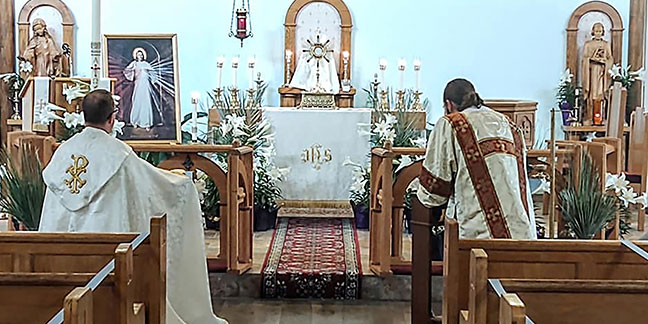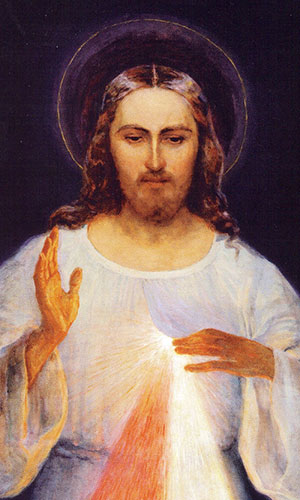Share God’s mercy with others during this pandemic, Bishop Jugis preaches on Divine Mercy Sunday
CHARLOTTE — God is merciful, and those who have experienced His mercy personally are called to be “ambassadors of His mercy to others,” Bishop Peter Jugis preached on Divine Mercy Sunday.
The bishop offered a private Mass April 19 at St. Patrick Cathedral that was streamed live on the Diocese of Charlotte’s YouTube channel. Watch the full Mass on-demand. Since the outbreak of the COVID-19 pandemic, most public Masses and other gatherings have been canceled due to public health guidance aimed at slowing the spread of the disease. The COVID-19 virus has so far sickened about 700,000 people and killed more than 36,000 in the United States, including 172 in North Carolina.
Praying for God’s mercy is particularly important now during the coronavirus pandemic “which has gripped the whole world in suffering, sorrow and fear,” Bishop Jugis said.
“We continue to ask God to have mercy on us, and to rid the world of this plague,” he said.
“God is merciful – that is the Easter message of the Risen Jesus,” he emphasized. The Passion, death and resurrection of Our Lord is “an expression of God Almighty’s loving mercy for the whole human race.”
“It is by that suffering, crucifixion, death and resurrection that Jesus has won our salvation,” he said. Almighty God “had mercy on us when we had turned away from God through sin, and He made His only Son the sacrifice for our sins, bringing us back to live in friendship with God.”
The Church manifests God’s mercy through prayer, the proclamation of the Gospel, the sacraments (particularly the sacrament of penance), and works of charity, Bishop Jugis said.
God “wants the mercy of Jesus to be continuously lived in the Church, in the sacrament of penance and in all the ministry of the Church. God wants His children in the Church to experience always this mercy, which at such great cost He won for us through His Son,” he said.
 In this screenshot, Father Casey Coleman and Deacon Matthew Newsome lead a Divine Mercy Chaplet and Holy Hour April 19 at St. Mary, Mother of God Church in Sylva. The Sylva parish joined many other churches around the diocese in livestreaming Masses or prayer services for Divine Mercy Sunday, so that people could still participate even as everyone is under “stay at home” orders due to the COVID-19 pandemic. (Della Sue Bryson | Catholic News Herald)Bishop Jugis recalled the two extra Solemn Intercessions that were prayed throughout the world during the Good Friday liturgy – an intercessory prayer to God for those sickened by the coronavirus and for those who have died from it.
In this screenshot, Father Casey Coleman and Deacon Matthew Newsome lead a Divine Mercy Chaplet and Holy Hour April 19 at St. Mary, Mother of God Church in Sylva. The Sylva parish joined many other churches around the diocese in livestreaming Masses or prayer services for Divine Mercy Sunday, so that people could still participate even as everyone is under “stay at home” orders due to the COVID-19 pandemic. (Della Sue Bryson | Catholic News Herald)Bishop Jugis recalled the two extra Solemn Intercessions that were prayed throughout the world during the Good Friday liturgy – an intercessory prayer to God for those sickened by the coronavirus and for those who have died from it.
These special prayers were “a beautiful sign of mercy in the world today,” he said. “Praying, petitioning and interceding with God for suffering humanity – the Church’s ministry of mercy in the midst of this world.”
“The mercy of God dwells within His Church,” he said, “and God wants His Church to be His merciful presence in the world. He wants the Church to be His mercy to all peoples in the world.”
“Through our prayers (and) through the witness of our lives, we bring the Risen Savior’s Easter message of hope, new life and salvation to everyone.”
He prayed, “May we who know that God is merciful, may we who have experienced personally that God is merciful and kind and our savior, may we who have experienced that Jesus is mercy, be the ambassadors of His mercy to others – on this Divine Mercy Sunday and always.”
— Catholic News Herald Photos by SueAnn Howell, Catholic News Herald.
What is Divine Mercy Sunday? Learn more here.
Divine Mercy Sunday: April 19
 Mankind’s need for the message of Divine Mercy took on dire urgency in the 20th century, when civilization began to experience an “eclipse of the sense of God” and, therefore to lose the understanding of the sanctity and inherent dignity of human life. In the 1930s, Jesus chose a humble Polish nun, St. Maria Faustina Kowalska, to receive private revelations concerning Divine Mercy that were recorded in her Diary. St. John Paul II explains: “This was precisely the time when those ideologies of evil, nazism and communism, were taking shape.
Mankind’s need for the message of Divine Mercy took on dire urgency in the 20th century, when civilization began to experience an “eclipse of the sense of God” and, therefore to lose the understanding of the sanctity and inherent dignity of human life. In the 1930s, Jesus chose a humble Polish nun, St. Maria Faustina Kowalska, to receive private revelations concerning Divine Mercy that were recorded in her Diary. St. John Paul II explains: “This was precisely the time when those ideologies of evil, nazism and communism, were taking shape.
Sister Faustina became the herald of the one message capable of off-setting the evil of those ideologies, that fact that God is mercy – the truth of the merciful Christ. And for this reason, when I was called to the See of Peter, I felt impelled to pass on those experiences of a fellow Pole that deserve a place in the treasury of the universal Church” St. John Paul II, “Memory and Identity” (2005).
In his second encyclical, “Rich in Mercy,” St. John Paul II offered an extended meditation on the mystery of God’s mercy, which he calls “the greatest of the attributes and perfections of God.” He returned to this theme throughout his pontificate.
On May 5, 2000, five days after the canonization of St. Faustina, the Vatican decreed that the Second Sunday of Easter would henceforth be known as Divine Mercy Sunday.
The devotion to Divine Mercy Sunday grew rapidly after its designation by the pope and is now widely celebrated by Catholics. The Divine Mercy image is often carried in processions on Divine Mercy Sunday, and is placed in a location in the church so that it can be venerated by those who attend the Mass
John Paul II, who died in April 2005 on the vigil of Divine Mercy Sunday, was himself beatified on Divine Mercy Sunday, May 1, 2011, by his successor, Pope Benedict XVI, and was canonized on Divine Mercy Sunday, April 27, 2014, by Pope Francis.
— USCCB
How to pray the Divine Mercy Chaplet
The Chaplet of Divine Mercy was given to St. Faustina with this promise: “Encourage souls to say the chaplet which I have given you” (Diary, 1541). “Whoever will recite it will receive great mercy at the hour of death. … Even if there were a sinner most hardened, if he were to recite this chaplet only once, he would receive grace from My infinite mercy. I desire that the whole world know My infinite mercy” (Diary, 687). The Divine Mercy Chaplet is prayed using a rosary:
Step 1: Begin with the Sign of the Cross, then say one Our Father, one Hail Mary and the Apostles Creed. An optional opening prayer is: “You expired, Jesus, but the source of life gushed forth for souls, and the ocean of mercy opened up for the whole world. O Fount of Life, unfathomable Divine Mercy, envelop the whole world and empty Yourself out upon us.” Then repeat three times: “O Blood and Water, which gushed forth from the Heart of Jesus as a fountain of Mercy for us, I trust in You!”
Step 2: Then on the beads where with the rosary you would pray an Our Father, say the following: “Eternal Father, I offer You the Body and Blood, Soul and Divinity of Your dearly beloved Son, Our Lord Jesus Christ, in atonement for our sins and those of the whole world.”
Step 3: On each of the 10 Hail Mary beads, say the following: “For the sake of His sorrowful Passion, have mercy on us and on the whole world.”
Repeat steps 2 and 3 for all five decades.
Step 4: Conclude by saying the following three times: “Holy God, Holy Mighty One, Holy Immortal One, have mercy on us and on the whole world.” An optional closing prayer is: “Eternal God, in whom mercy is endless and the treasury of compassion inexhaustible, look kindly upon us and increase Your mercy in us, that in difficult moments we might not despair nor become despondent, but with great confidence submit ourselves to Your holy will, which is Love and Mercy itself.”

















